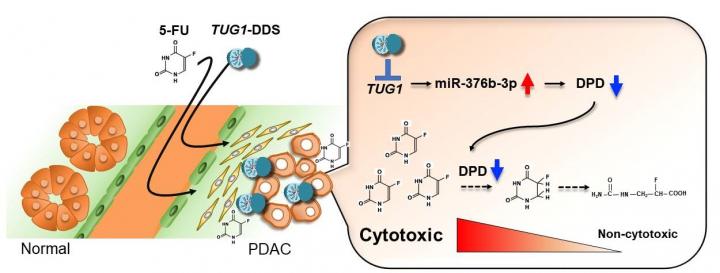Suppressing a gene regulator could reduce pancreatic cancer resistance to vital chemotherapeutic treatment.

Credit: Yutaka Kondo
Nagoya University researchers and colleagues in Japan have uncovered a molecular pathway that enhances chemotherapy resistance in some pancreatic cancer patients. Targeting an RNA to interrupt its activity could improve patient response to therapy and increase their overall survival.
“Pancreatic cancer is one of the most aggressive human malignancies, with an overall median survival that is less than five months,” says cancer biologist Yutaka Kondo of Nagoya University Graduate School of Medicine. “This poor prognosis is partially due to a lack of potent therapeutic strategies against pancreatic cancer, so more effective treatments are urgently needed.”
Kondo and his colleagues focused their attention on a long noncoding RNA (lncRNA) called taurine upregulating gene 1 (TUG1). lncRNAs are gene regulators, several of which have recently been identified for helping some cancers resist chemotherapy. TUG1 is already known for being overexpressed in gastrointestinal cancers that have poor prognosis and are resistant to chemotherapy.
The researchers found TUG1 was overexpressed in a group of patients with pancreatic ductal adenocarcinoma. These patients were resistant to the standard chemotherapy treatment 5-fluorouracil (5-FU), and died much sooner compared to cancer patients with low TUG1 expression levels.
Further laboratory tests showed TUG1 counteracts a specific microRNA, leading to increased activity of an enzyme, called dihydropyrimidine dehydrogenase, which breaks down 5-FU into a compound that can’t kill cancer cells.
Kondo and his team found they could suppress TUG1 during 5-FU treatment of mice with pancreatic cancer by using antisense oligonucleotides attached to a specially designed cancer-targeting drug delivery system. Antisense oligonucleotides interfere with gene expression.
“Our data provides evidence that our therapeutic approach against pancreatic cancer could be promising,” says Kondo.
The team now plans to conduct further laboratory investigations to test the effectiveness of their therapeutic strategy.
###
Their study, “Cancer-specific targeting of taurine upregulated gene 1 enhances the effects of chemotherapy in pancreatic cancer,” was published online in the journal Cancer Research on March 1, 2021 at DOI: 10.1158/0008-5472.CAN-20-3021.
Authors:
Yoshihiko Tasaki, Miho Suzuki, Keisuke Katsushima, Keiko Shinjo, Kenta Iijima, Yoshiteru Murofushi, Aya Naiki Ito, Kazuki Hayashi, Chenjie Qiu, Akiko Takahashi, Yoko Tanaka, Tokuichi Kawaguchi, Minoru Sugawara, Tomoya Kataoka, Mitsuru Naito, Kanjiro Miyata, Kazunori Kataoka, Tetsuo Noda, Wentao Gao, Hiromi Kataoka, Satoru Takahashi, Kazunori Kimura, and Yutaka Kondo
About Nagoya University, Japan
Nagoya University has a history of about 150 years, with its roots in a temporary medical school and hospital established in 1871, and was formally instituted as the last Imperial University of Japan in 1939. Although modest in size compared to the largest universities in Japan, Nagoya University has been pursuing excellence since its founding. Six of the 18 Japanese Nobel Prize-winners since 2000 did all or part of their Nobel Prize-winning work at Nagoya University: four in Physics – Toshihide Maskawa and Makoto Kobayashi in 2008, and Isamu Akasaki and Hiroshi Amano in 2014; and two in Chemistry – Ryoji Noyori in 2001 and Osamu Shimomura in 2008. In mathematics, Shigefumi Mori did his Fields Medal-winning work at the University. A number of other important discoveries have also been made at the University, including the Okazaki DNA Fragments by Reiji and Tsuneko Okazaki in the 1960s; and depletion forces by Sho Asakura and Fumio Oosawa in 1954.
Website: http://en.
Media Contact
Yutaka Kondo
[email protected]
Original Source
https:/
Related Journal Article
http://dx.




